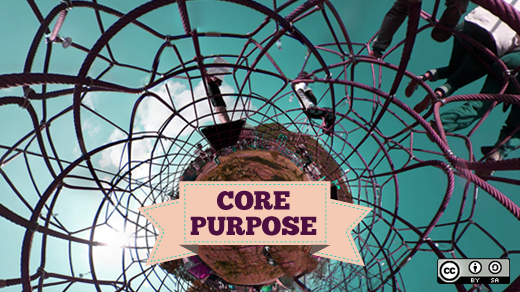I've never been much for clubs. When I was young, I made a lousy cub scout. I wasn't a real "joiner" in high school or college either (just enough to get by) and I still don't get actively involved in many professional associations today.
But I'm a sucker for a noble mission. I find myself getting drawn into all sorts of things these days. Good causes, interesting projects, even big ideas like the reinvention of management all share my extra attention, brainpower, and resources.
I love to contribute to things I believe in.
So why don't I care much for clubs or associations? They are typically groups of people who have come together to support a common purpose. Right?
I believe many of these groups have fallen into the trap of losing touch with the core purpose that brought the initial group of people together in the first place.
They have lost their raison d'etre.
In the beginning, most clubs start off as communities. In fact, the definition of a club is "an association of two or more people united by a common interest or goal." Which is pretty similar to this definition of a community: a "self-organized network of people with common agenda, cause, or interest, who collaborate by sharing ideas, information, and other resources."
So what goes wrong? How and why do clubs and associations lose their sense of purpose?
First, let's take a quick look at how a community might grow in an ideal setting. Watch the short animation below before you read on:
A community starts with a core purpose, which draws people together. Some people hold that purpose very closely, while others participate at a distance.
The key is that every member of the community is in orbit around the purpose, whether at the distance of Mercury or the distance of Pluto. They are not in orbit around other community members or community leadership.
People can move in and out of close orbit over time, but there are no walls saying you are either part of the community or not part of it. You can participate to the level of your interest and never worry about getting kicked out. Every contribution helps.
Great communities have people in active, close orbits around the purpose, but also have people in the outer orbits. Great communities are inclusive, recognizing that these folks in the outer orbits are often connectors, well positioned to build relationships with other communities they might also orbit.
Now watch this next animation. It starts the same way, but you'll quickly see where community starts turning into a club.
About a third of the way through, you'll notice that someone get the bright idea to put a wall of membership around the community. Meaning, you are either formally in the community or you are not.
Membership can come in different forms. It could mean mandatory payments or dues. It could mean an application process. Or an initiation. Or hazing. Whatever.
But once the wall of membership is built, the casual participants are shut out. It is no longer easy to lurk on the fringe of the community. Commit or commit not, there is no middle ground.
In my experience, it is when this wall of membership gets constructed that another interesting effect starts to occur:
The event of joining an organization often becomes more important than the purpose of the organization itself.
In some of these club-communities the actual purpose is to get into the club. Once you are in, there is no further purpose beyond simply reveling in your membership with other members. Ah, membership does indeed have its privileges.
In other club-communities, the purpose still exists, but as the animation shows, it becomes less and less important over time as things like control, power, and politics begin to take over.
Eventually, the purpose of the organization becomes simply to perpetuate its own existence. Often, members find themselves orbiting other members—the ones in leadership positions—rather than orbiting a core purpose at all.
These sort of stagnant organizations hold little interest for me.
Now maybe you like clubs more than I do. Maybe you are an extrovert who likes the great parties, luncheons, conferences, etc. and doesn't need to be contributing to a higher cause. If this is you, let me assure you that I don't think there is anything fundamentally wrong with clubs. They can be a lot of fun. Or so I hear.
But if the real goal is to achieve a core purpose, to make change happen, will a club environment get you there?
A better structure might be to design the community to be as open and inclusive as possible, giving people the opportunity to contribute and benefit at whatever level they see fit. A strong center of gravity around a deeply-held, clearly-expressed core purpose will hold people's attention, keep them in orbit.
Remember the old open source adage: "Given enough eyeballs, all bugs are shallow."
Your active, passionate participants will attract more participants, and with enough people contributing, perhaps your community will grow big enough to eventually either achieve its core purpose or at least make significant progress in the right direction.






7 Comments